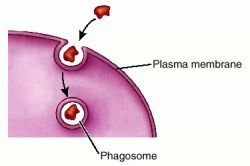Phagocytosis definition

What is Phagocytosis and Definition
Phagocytosis - the process through which a PHAGOCYTE (a specialized LEUKOCYTE) consumes a PATHOGEN or other cellular particle. Phagocytosis is a key defense mechanism of the body’s IMMUNE RESPONSE and may take place in the BLOOD, primarily the domain of granulocytes (neutrophils and eosinophils), and in the tissues, primarily the realm of tissue-based monocytes (macrophages). When a pathogen invades the body, the immune response sends substances called opsonins to coat its surface. This process, called opsonization, marks the pathogen, attracting phagocytes. The most common opsonins are antibodies and the proteins the complement system produces.
The blood and the LYMPH carry phagocytes to the sites of opsonized pathogens. When the phagocyte reaches the pathogen it extends its cell wall to enclose the pathogen within its cytoplasm. Once enclosure is complete the phagocyte releases enzymes called lysozymes that digest the pathogen, breaking it down into its molecular components which the cell then recycles or releases as metabolic waste. The primary bloodbased phagocytes are neutrophils, which respond to pathogens, and eosinophils, which respond to antigens. Monocytes circulate in the blood only for about 12 hours and then migrate into the tissues. Specialized phagocytes in the LIVER, the Kupffer cells, function in a somewhat cannibalistic manner, cleansing expired granulocytes from the circulating blood and recycling their molecular components into the bloodstream for other uses.
See also MONONUCLEAR PHAGOCYTE SYSTEM.
Open discussion on the topic Phagocytosis definition
Similar interests
- Nuovi Casino
- Casinos Not On Gamstop
- UK Casinos Not On Gamstop
- Casinos Not On Gamstop
- UK Casinos Not On Gamstop
- Casino Non Aams Italia
- Slot Sites Not On Gamstop
- Meilleur Casino En Ligne
- Non Gamstop Casino Sites UK
- Meilleur Casino En Ligne
- Casino En Ligne France
- Best Non Gamstop Casinos
- Casinos Not On Gamstop
- UK Casino Not On Gamstop
- Casinos Not Signed Up To Gamstop
- Best Slot Sites UK
- Non Gamstop Casino Sites UK
- Online Casinos Nederland
- Online Casinos Nederland
- Casinos Not On Gamstop
- Best New Uk Casinos Not On Gamstop
- Casino Non Aams
- Non Gamstop Casinos UK
- Migliori Siti Casino Non Aams
- Bitcoin Casinos